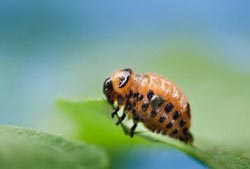Microbes help beetles defeat plant defenses

This is a Colorado potato beetle larva.<br>Credit: Gary Felton, Penn State<br>
“For the last couple of decades, my lab has focused on induced defenses in plants,” said Gary W. Felton, professor and head of entomology. “We had some clues that oral secretions of beetles suppressed defenses, but no one had followed up on that research.”
Seung Ho Chung, graduate student in entomology working with Felton, decided to investigate how plants identified chewers and how herbivores subverted the plants defenses.
“I thought we could identify what was turning the anti-herbivore reaction off,” said Felton. “But it was a lot more difficult because we had not considered microbes.”
According to Felton, the beetles do not have salivary glands and so they regurgitate oral secretions onto the leaves to begin digestion. These secretions contain gut bacteria.
Plant defenses against chewing insects follow a jasmonite-mediated pathway that induces protease inhibitors and polyphenol oxidase, which suppress digestion and growth. Plant defenses against pathogens follow a salicylic acid mediated pathway. When the antimicrobial response turns on, it interferes with the response to chewing, allowing the beetles to develop more normally.
Chung and Felton used tomato plants to identify exactly what was turning off the response to chewing. They note, however, that the Colorado potato beetle also attacks eggplant and potato plants. They report the results of their work in the current online edition of the Proceedings of the National Academy of Sciences.
The researchers allowed beetle larva to feast on antibiotic-treated leaves and natural leaves and found that on the antibiotic-treated leaves, the beetles suffered from the plant's anti-herbivore defense, but on the natural leaves the larva gained more weight and thrived.
Chung and Felton then investigated expression of genes in the anti-herbivore pathway and the production of enzymes. They found that the presence of bacteria decreases the anti-herbivore response.
The researchers also isolated and grew the bacteria from the Colorado potato beetle guts. They found 22 different types of bacteria, but only three types suppressed the anti-herbivore response. During a variety of other experiments, they found that in all cases presence of the bacteria that could suppress the anti-herbivore response led to healthier beetles.
The researchers are now beginning to see if these bacteria are present in Colorado potato beetles all over the U.S. and also in Europe.
Also working on this project were Cristina Rosa, research associate in entomology; Erin D. Scully, graduate student in the intercollege program in genetics; Michelle Peiffer, research assistant in entomology; John F. Tooker, assistant professor of entomology; Kelli Hoover, professor of entomology and Dawn S. Luthe, professor of plant science.
The U.S. Department of Agriculture and the National Science Foundation supported this work.
Media Contact
More Information:
http://www.psu.eduAll latest news from the category: Life Sciences and Chemistry
Articles and reports from the Life Sciences and chemistry area deal with applied and basic research into modern biology, chemistry and human medicine.
Valuable information can be found on a range of life sciences fields including bacteriology, biochemistry, bionics, bioinformatics, biophysics, biotechnology, genetics, geobotany, human biology, marine biology, microbiology, molecular biology, cellular biology, zoology, bioinorganic chemistry, microchemistry and environmental chemistry.
Newest articles

Machine learning algorithm reveals long-theorized glass phase in crystal
Scientists have found evidence of an elusive, glassy phase of matter that emerges when a crystal’s perfect internal pattern is disrupted. X-ray technology and machine learning converge to shed light…

Mapping plant functional diversity from space
HKU ecologists revolutionize ecosystem monitoring with novel field-satellite integration. An international team of researchers, led by Professor Jin WU from the School of Biological Sciences at The University of Hong…

Inverters with constant full load capability
…enable an increase in the performance of electric drives. Overheating components significantly limit the performance of drivetrains in electric vehicles. Inverters in particular are subject to a high thermal load,…





















